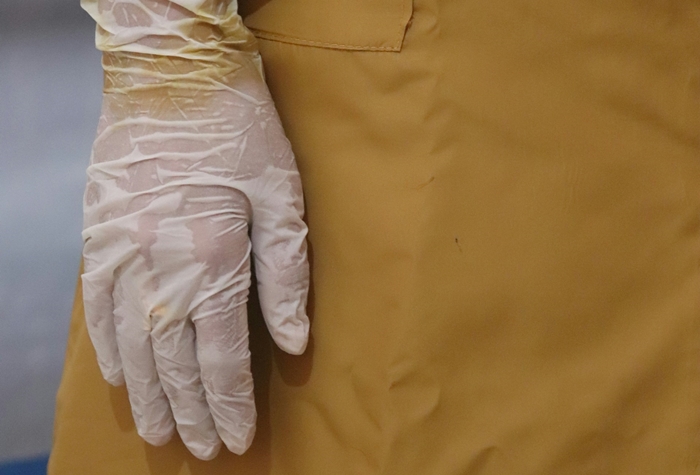Nurses have a varied daily schedule depending on where they work, what type of environment or nursing role they have, and even their experience can dictate what responsibilities and tasks they need to perform each day.

However, for a typical registered nurse, their day is chock full of tasks with very limited time to sit down and rest, and this is one of the major reasons that nurses start their day with nursing shoes because they’re constantly on their feet for 12-hour shifts.
Typical Day For A Registered Nurse
Nurses typically work 12-hour shifts for 3-4 days a week before taking a 3-4 day break, which should indicate that their days are incredibly long and busy with little rest.
For nurses, there is no typical day as patient needs, emergencies, and new situations will dictate the requirements for the day; there may be a plan but that quickly changes as the day progresses.

Typical daily tasks for a nurse include:
- Checking patient stats and recording in patient charts
- Direct patient care, which can include handing out medications, assessing injuries or emotional states, and triaging patients to the appropriate departments.
- Review patient lab reports
- Educating patients on the requirements for their own homecare and next steps
- Supervising and assistant nursing assistants and other nurses
- Setting up treatment rooms based on patient needs
- Provide wound care or treatments
Change Of Shift Report
Nurses working in shifts will typically start their day by taking a handover from the previous shift so that they’re aware of any new problematic patients, healthwise or for other reasons, and can be provided with any crucial information or changes that they need to know.
This is also a time for nurses to review any specific tasks for their day, check on doctor’s notes, and review the patients they need to check on throughout the day, which can help determine which patients need to be seen first.
Morning Rounds
Morning rounds have nurses checking on patients, providing medication, recording stats, and fulfilling any other tests or tasks ordered by the doctor. All patients need to be seen, and all tasks carried out; if medication or tests are missed, it can cause major problems for the patient.

New patients ill also need to be reviewed and helped; often this can mean admitting them, helping bandage wounds, referring them to other departments, and triaging for doctors in your own department or area.
Afternoon Rounds
Afternoon rounds provide another opportunity to check on patients, provide medication, assist with any patient issues and also see whether symptoms or vitals have changed at all.

It’s also a time that many patients may be getting discharged, and new patients are being admitted, which means taking initial tests, vitals, and ensuring the patients have everything they need and that all doctor’s orders are scheduled and being done.
Charting And End Of Shift Report
At the end of a nurse’s shift, the nurse should be ensuring that all tasks have been completed, such as updating patient charts, all medication handed out, patient requests have been completed, and documenting anything required for the next shift.
Ensuring that a proper handover to completed with the next shift ensures that no patient gets missed and all tasks get performed in the appropriate amount of time.
How Do Different Environments Change A Nurse’s Daily Routine?
Nurses can work in doctor’s offices, hospitals, specialist doctor offices, and many other areas. So the environment a nurse works in has a significant impact on their daily routine and even the types of tasks required.
Hospitals take the majority of registered nurses, so the daily routine above is more typical than others for a nurse. But even in hospitals, you could be working in an ICU, ER, pediatric unit, or many other departments.

Nurses that work in doctor’s offices will often have a more scheduled day, with patients that book appointments and simply need referrals to specialists, medication dispensed, or simple treatments performed, often by a nurse. A nurse will provide assistance for whatever the doctor determines is needed for each patient.
For some nurses that work for specialists in hospitals or private practice, they will be part of the procedure or treatment while the doctor is performing it, assisting. They will also conduct pre and post-operative care so that patients meet all requirements for procedures, and then are cared for and provided education after it’s all completed.
A Day In The Life Of A Nurse Is Varied
Nurses are often on the frontline of care for patients that need help; the duties and tasks of a nurse can change daily and even change mid-day as new patients come and new problems arise. A nurse needs to constantly adjust their day to meet current patient care and handle new patients that often can’t be predicted. However, it’s crucial that no patient care is forgotten; otherwise, there can be severe problems for the patient.
Frequently Asked Questions
How do nurses maintain their own well-being while caring for others?
Nurses understand the importance of self-care and prioritize their well-being while caring for others. They engage in activities that promote physical and mental health, such as regular exercise, healthy eating, and sufficient rest. Nurses also practice stress management techniques, such as deep breathing exercises, mindfulness, and taking breaks when needed. They seek emotional support from colleagues, friends, or support groups to process their experiences and prevent burnout. Additionally, nurses set boundaries and practice self-reflection to maintain a healthy work-life balance and prevent compassion fatigue. By prioritizing their own well-being, nurses can continue to provide quality care to their patients.
How do nurses manage their workload and stay organized?
Nurses have excellent organizational skills to manage their workload effectively. They prioritize tasks based on patient needs, urgency, and criticality. Nurses often use various tools, such as electronic health record systems, to track patient information, document care provided, and coordinate with the healthcare team. They utilize time management techniques, such as setting realistic goals, delegating tasks when appropriate, and effectively communicating with colleagues. Additionally, nurses may use physical and digital tools, such as calendars, checklists, and reminder apps, to stay organized and ensure they meet their responsibilities.
How do nurses handle stressful situations in their work?
Nursing can be a demanding and high-stress profession, but nurses develop coping strategies to handle stress effectively. They prioritize self-care practices, such as engaging in physical exercise, practicing mindfulness or meditation, and maintaining a healthy work-life balance. Nurses also seek support from their colleagues and participate in debriefing sessions or support groups to share experiences and emotions. Additionally, they utilize effective communication skills to express concerns, ask for help when needed, and engage in collaborative problem-solving. Employers also play a role in supporting nurses by providing resources for stress management and promoting a positive work environment.
What qualities make a great nurse?
Several qualities contribute to being a great nurse. Empathy and compassion are crucial, as nurses interact with patients during vulnerable times. Good communication skills are essential for effectively conveying information to patients, their families, and the healthcare team. Critical thinking and problem-solving abilities enable nurses to assess complex situations, make informed decisions, and provide optimal care. Adaptability and resilience help nurses handle unexpected challenges and changes in healthcare settings. Finally, a commitment to continuous learning and professional growth allows nurses to stay updated with the latest healthcare advancements and provide evidence-based care.
You may also like
Why is it Important for Nurses to Wear Comfortable Shoes?
Nurses have a hard job. They’re up all day caring for dozens of patients. They…
Alegria Classic Clog for Women Review
This is the clog that started everything. The Alegria Classic Clog for Women is available…
Nursing in Global Healthcare: Challenges and Opportunities
The Pivotal Role of Nursing in Global Healthcare Nursing plays a pivotal role in global…
What is the most comfortable shoe for nursing?
As a nurse, your feet are your most valuable asset. They carry you through long…
Nursing During Disasters: Preparedness, Response, and Lessons from Recent Crises
The Vital Role of Nurses in Disaster Response Nurses play a vital role in disaster…
Nursing Ethics: Navigating Complex Moral Dilemmas in Healthcare
The Crucial Role of Nursing Ethics Nursing ethics forms the moral compass that guides nurses…






